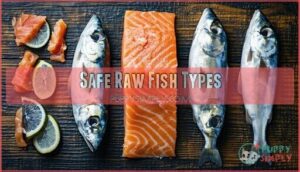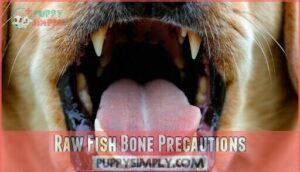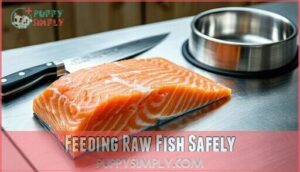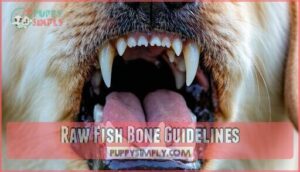This site is supported by our readers. We may earn a commission, at no cost to you, if you purchase through links.
 No, you shouldn’t let your dog eat raw fish bones.
No, you shouldn’t let your dog eat raw fish bones.
They’re dangerous for several reasons: they can splinter in your dog’s mouth or throat causing choking, puncture internal organs, or harbor harmful bacteria like salmonella.
Even small bones pose significant risks.
While dogs in the wild might eat fish, your domestic pet lacks their specialized digestive system.
If you want to give your dog fish, always remove all bones completely and consider cooking it thoroughly to kill potential parasites.
Many pet owners don’t realize that safer alternatives exist that can provide similar nutritional benefits without putting your furry friend at risk.
Table Of Contents
- Key Takeaways
- Raw Fish Bones Risks
- Can Dogs Eat Raw Fish
- Safe Raw Fish Types
- Raw Fish Bone Precautions
- Health Benefits of Raw Fish
- Raw Fish Bone Alternatives
- Feeding Raw Fish Safely
- Raw Fish Bone Guidelines
- Frequently Asked Questions (FAQs)
- What happens if a dog eats a fish bone?
- What raw bones can dogs eat?
- Can raw fish bones be combined with other foods?
- How often can dogs eat raw fish?
- Are fish scales safe for dogs?
- Do fish bones affect senior dogs differently?
- Can puppies safely consume fish bones?
- How long can raw fish stay refrigerated?
- Conclusion
Key Takeaways
- You should never feed your dog raw fish bones as they can splinter and cause choking, internal injuries, or puncture organs from the mouth to intestines.
- Raw fish bones harbor dangerous bacteria like salmonella and listeria that can lead to serious infections in your pet, causing symptoms like vomiting, diarrhea, and fever.
- If you want to give your dog fish, always remove all bones completely and consider cooking it thoroughly to kill potential parasites, or choose safer fish like sardines packed in water.
- Safer alternatives to raw fish bones include dental chews, properly sized rawhide (with supervision), or frozen Kongs filled with dog-friendly ingredients that satisfy your dog’s natural urge to chew.
Raw Fish Bones Risks
You’ll risk your dog’s safety when you feed them raw fish bones that can cause choking or tear their internal organs.
Raw fish bones also carry harmful bacteria that may lead to serious infections in your pet.
Choking Hazards
Raw fish bones are a serious choking hazard for your dog.
These small, sharp bones can easily get lodged in your pet’s throat, blocking their airway.
Smaller breeds have a higher predisposition to choking due to their narrower throats.
Always monitor your dog when introducing any new food.
Know emergency response techniques like the canine Heimlich maneuver.
Prevention methods include complete bone removal before feeding fish to guarantee dog safety.
Fish are nutritious, but mercury contamination is possible, and it’s crucial to consider dog safety and be aware of mercury contamination.
Internal Injuries
Beyond choking hazards, fish bones can cause serious internal injuries in your dog.
Fish bones can lead to severe internal injuries, puncturing organs and causing life-threatening damage from the esophagus to the intestines.
These small bone fragments may puncture your dog’s digestive tract from mouth to intestines.
- Fish bone fragments can tear the esophagus, creating painful wounds
- Sharp bones might puncture intestinal walls, leading to peritonitis risk
- Intestinal blockages can occur when bones collect in the digestive tract
Internal organ damage often shows symptoms hours after eating, making fish bone dangers harder to detect immediately, which can lead to severe consequences, including internal injuries.
Bacterial Contamination
Why should you worry about fish bones? Those tiny raw fish bones sitting in your dog’s bowl aren’t just choking hazards.
They can harbor dangerous bacteria like salmonella, listeria, E. coli, and Clostridium perfringens. These pathogens cause serious dog bacterial infections including vomiting, diarrhea, and fever.
Proper handling and bacterial prevention methods are essential when dealing with raw fish to protect your pet from these invisible threats.
Can Dogs Eat Raw Fish
While raw fish bones can pose risks, you might wonder if raw fish itself is safe for your dog.
The answer isn’t black and white.
Dogs with healthy immune systems can generally handle raw fish, but those with compromised immunity need caution.
Raw fish for dogs comes with several concerns.
It may contain parasites like tapeworms, roundworms, and flukes.
Bacteria such as listeria and salmonella pose additional risks.
Pacific salmon specifically can cause salmon poisoning disease from Neorickettsia helminthoeca.
The good news is that these raw fish risks can be managed.
Freezing fish at -4°F for seven days kills most parasites.
Many store-bought fish are already frozen, reducing concerns.
When feeding dogs fish, always remove bones completely.
Watch for symptoms like vomiting, diarrhea, fever, or weight loss after consumption, and contact your vet immediately if they appear.
Safe Raw Fish Types
You’ll find that smaller fish species like sardines, wild-caught salmon, and arctic char are safer options for dogs when served raw.
These fish types contain softer bones and fewer parasites than larger predatory fish, making them better choices when introducing raw fish to your pet’s diet, as they are safer options.
Wild Caught Salmon
Wild-caught salmon stands as one of the best fish options for your dog.
This nutritious seafood provides three key benefits:
- Rich omega-3 fatty acids for skin and coat health
- High-quality protein for muscle maintenance
- Essential vitamins D and B for overall wellness
When feeding raw fish to dogs, always opt for sustainable fishing sources.
The nutritional profile of wild-caught salmon outshines farmed varieties, though proper preparation remains vital to minimize parasite prevalence.
Sardines
Unlike salmon, sardines offer excellent nutrition for your dog with minimal risk.
These small fish come with soft, edible bones that provide calcium and phosphorus for strong teeth and joints.
| Sardine Type | Preparation | Safety Level |
|---|---|---|
| Fresh | Remove heads | Very Safe |
| Canned in water | Drain and rinse | Safe |
| Packed in oil | Avoid | Not Recommended |
| Frozen | Thaw completely | Safe |
Choose sardines packed in water, not oil or brine, to prevent digestive issues.
It is crucial to select the right type of sardines to ensure they are very safe for consumption, and following the preparation guidelines is key to maintaining their nutritional value.
Arctic Char
While sardines offer benefits, Arctic char presents another excellent fish option for your dog.
This low-mercury fish is packed with omega-3 fatty acids that support your pup’s health.
When sourcing Arctic char, look for sustainable options. Though safer than many species, always remove fish bones before feeding to prevent choking hazards.
As a complete protein source, fish supports muscle development. Arctic char’s nutritional value is similar to salmon but typically contains fewer contaminants, making it a smart choice for health-conscious pet owners.
Flounder
Moving on from Arctic Char, Flounder presents another option in your safe fish menu. This flatfish offers excellent flounder nutrition with low fat content and beneficial omega-3s.
You should cook and debone flounder completely for dog bone safety.
- Contains valuable B vitamins and niacin
- Low mercury levels compared to other fish species
- Flounder sustainability practices in U.S. make it an eco-friendly choice
- Fish bones present serious fish bone dangers including choking
- Proper flounder preparation removes risky small bones
Raw Fish Bone Precautions
You must take care when giving your dog raw fish to prevent harm from small bones that can cause choking or internal damage.
Always check and remove all bones before serving or consider freezing the fish which makes bones easier to spot and remove, to ensure your dog’s safety from internal damage.
Removing Bones
Every fish bone needs careful removal before feeding raw fish to your dog.
Start by placing the fish on a clean surface for bone identification. Use tweezers for manual removal of visible bones, focusing on the spine and ribs.
Consider grinding fish to eliminate choking hazards completely. Even tiny bones can cause oral trauma, so thorough inspection prevents dog bone safety issues, ensuring dog bone safety is maintained.
Freezing Fish
Freezing raw fish is your best defense against fish parasites that could harm your dog.
The freezing process kills most parasites while maintaining nutrient retention.
Keep fish frozen at -4°F for at least 7 days for parasite elimination.
Be aware that freezing causes texture changes but doesn’t affect fish bones, which still pose risks.
Even cooked fish bones can be dangerous, posing a serious choking hazard.
Always follow safe thawing practices in your refrigerator, never at room temperature, to ensure the fish is handled properly and remains a healthy option.
Cooking Fish
While frozen fish helps eliminate parasites, cooking fish thoroughly is your safest option for dogs.
Heat transforms dangerous raw fish bones into brittle hazards that splinter easily.
Follow these cooking methods for safety:
- Bake fish at 375°F for 15-20 minutes until fully cooked
- Remove all bones completely before serving
- Avoid all seasonings, especially garlic and onion
- Allow cooked fish to cool before feeding
Health Benefits of Raw Fish
You’ll find that raw fish offers your dog impressive health benefits including omega-3 fatty acids that reduce inflammation and improve coat health.
Raw fish can also enhance your dog’s digestion when fed properly in appropriate amounts, which is a key factor in maintaining overall health and includes benefits such as improved digestion.
Omega 3 Fatty Acids
Packing a powerful nutritional punch, omega-3 fatty acids in raw fish offer your dog significant health benefits.
These essential nutrients support heart health, reduce inflammation, and promote a shiny coat.
You’ll find high levels in salmon, sardines, and mackerel.
Most dogs need about 20mg per pound of body weight daily.
Without enough omega-3s, your dog may show dry skin or joint pain.
Consider fish oil supplements if raw options aren’t suitable.
Improved Digestion
While Omega-3s enhance your dog’s coat, raw fish also works wonders for their digestion.
The natural enzymes in uncooked fish help your dog break down food more efficiently.
Dogs who eat raw fish typically develop a balanced gut microbiome, which prevents excessive intestinal fermentation.
You’ll notice the difference in stool quality too—smaller, firmer, and less smelly droppings indicate your pet’s body is using those high-quality proteins and fats more completely, resulting in a healthier pet with a better coat.
Reduced Inflammation
The raw fish that benefits your dog’s digestion also fights inflammation in their body.
The omega-3 fatty acids in raw fish can reduce swelling and pain throughout your dog’s system.
Here are 5 inflammation-fighting benefits of raw fish for dogs:
- Eases joint pain and stiffness
- Improves skin conditions and reduces itching
- Provides allergy relief for sensitive dogs
- Supports gut health by reducing intestinal inflammation
- Boosts immune function through anti-inflammatory properties
Raw Fish Bone Alternatives
You can give your dog safer chewing options like dental treats, raw hide, or frozen Kongs instead of risky fish bones.
These alternatives satisfy your dog’s natural urge to chew while reducing the dangers of choking or internal injuries, making them a better choice for your pet’s health and safety.
Dental Chews
Dental chews offer a safer alternative to fish bones for dogs.
When choosing them, check chew ingredients for quality proteins and avoid artificial additives.
Most dental chews provide better chew digestibility than raw bones with lower risk.
Their chew effectiveness removes plaque while satisfying your dog’s natural urge to gnaw.
You can find many dog dental chew options online.
Chew safety is also superior, eliminating concerns about splintering or internal damage that comes with bones dogs can eat, making dental chews a practical solution.
Raw Hide
While dental chews offer one solution, rawhide provides another alternative to raw fish bones for dogs.
Rawhide benefits include promoting dental health and satisfying your dog’s natural chewing instinct.
However, be aware of rawhide safety concerns – they can pose choking hazards or cause digestive blockages.
Always supervise your dog when they’re enjoying rawhide, make certain of proper sizing, and avoid giving them to aggressive chewers.
For rawhide alternatives, consider consulting your veterinarian about what bones dogs can eat safely to ensure your dog’s well-being and natural chewing instinct.
Frozen Kongs
While rawhide has its fans, Frozen Kongs offer a safer alternative to raw fish bones.
You can fill them with dog-friendly ingredients and freeze for hours. Many dogs love chewing these durable rubber toys.
Mix in nutritional additives like plain yogurt or pumpkin for added benefits.
Consider purchasing durable options for your furry friend. Always use Kong safety tips and provide supervised chewing time, especially for aggressive chewers on a raw food diet, to ensure a safe experience.
Feeding Raw Fish Safely
You’ll need to handle raw fish with extreme care to prevent harmful bacteria from spreading to you or your pet.
Always wash your hands and clean all surfaces after touching raw fish, and monitor your dog for any signs of illness after feeding, to ensure extreme care is taken.
Handling Raw Fish
While dental chews and Kongs offer safer alternatives, proper handling of raw fish is just as important for your dog’s safety. When feeding raw fish, you must follow strict hygiene practices.
Here are three key rules for safe handling:
- Thaw frozen fish in the refrigerator, never at room temperature
- Limit storage duration to 1-2 days in the refrigerator
- Use dedicated preparation surfaces and sanitize utensils immediately
These steps minimize bacteria and parasite risks in your dog’s raw diet. For ideal preservation, consider investing in a specialized freezer option.
Preventing Cross Contamination
Cross contamination is a serious risk when feeding your dog raw fish.
Always follow these safety steps to protect both you and your pet.
| Safety Measure | Why It Matters | How To Do It |
|---|---|---|
| Hand Washing | Prevents bacteria spread | Use soap for 20 seconds |
| Surface Disinfection | Kills harmful pathogens | Use food-safe cleaners |
| Utensil Cleaning | Stops bacteria transfer | Wash in hot water |
| Food Storage | Maintains fish safety | Keep below 40°F in sealed containers |
Monitoring Dog Health
After feeding your dog raw fish, watch for parasite symptoms like vomiting or diarrhea.
Monitor for weight changes that might signal dietary needs aren’t being met. Signs of mercury poisoning include tremors and coordination issues.
Bacterial infections can cause fever and lethargy. Check your dog’s stool for 24-48 hours to verify proper fish bones digestion.
Pet health risks decrease with careful observation of dog digestion patterns, which is crucial for preventing bacterial infections.
Raw Fish Bone Guidelines
You’ll need to follow specific guidelines when feeding raw fish bones to your dog to guarantee their safety.
Always remove small bones that could cause choking and limit raw fish treats to no more than 10% of your dog’s daily diet.
Serving Sizes
The right serving size of raw fish for your dog depends on several factors.
When calculating portions, keep these guidelines in mind:
- Small dogs (under 20 lbs): 1-2 tablespoons per serving
- Medium dogs (20-50 lbs): 1-3 ounces per serving
- Large dogs (50-100 lbs): 2-5 ounces per serving
- Giant breeds (over 100 lbs): 4-8 ounces per serving
Treats should never exceed 10% of daily calorie calculation.
Always supervise your dog for signs of distress after feeding raw fish to ensure their safety and monitor for any signs of distress.
Nutritional Balance
When feeding your dog raw fish bones, balance is key.
The ideal raw diet includes 70% muscle meat, 10% edible bone, 7% vegetables, 5% secreting organs, 5% liver, 2% seeds/nuts, and 1% fruit.
Too much muscle meat without other components can cause nutrient deficiencies.
Raw fish bones contribute calcium and phosphorus for dental health, but should only make up about 10% of your dog’s overall dietary intake for ideal dog nutrition and health.
Veterinary Consultation
While balancing your dog’s diet is important, veterinary consultation should come first.
Your vet can assess your dog’s specific needs before introducing raw fish bones.
Always report symptoms like vomiting or lethargy immediately.
Vets may recommend diagnostic testing for parasites if you’ve fed raw fish.
They’ll suggest safe bone consumption practices, treatment options for any issues, diet adjustments, and preventative care plans customized to your pet’s health risks, including preventative care.
Frequently Asked Questions (FAQs)
What happens if a dog eats a fish bone?
Your dog Bailey yelped after gulping a fish bone.
Fish bones can get stuck in your dog’s throat, causing choking. They might also damage internal organs.
Contact your vet immediately if this happens.
What raw bones can dogs eat?
You can safely give your dog raw beef, lamb, and venison bones. Raw chicken and turkey necks work well too. Always supervise and choose appropriate sizes to prevent choking hazards.
Can raw fish bones be combined with other foods?
Like combining ingredients in a delicate recipe, you shouldn’t mix raw fish bones with other foods for your dog.
This prevents choking hazards and makes it easier to monitor how they’re handling the bones.
How often can dogs eat raw fish?
You can feed your dog raw fish 1-2 times weekly as an occasional treat.
It should make up less than 10% of their diet.
Always remove bones and freeze fish first to kill parasites.
Are fish scales safe for dogs?
Fish scales are generally safe for dogs but aren’t easily digestible.
You can feed them in small amounts, but it’s better to remove scales when possible to prevent potential digestive discomfort or intestinal irritation.
Do fish bones affect senior dogs differently?
Just as old joints need extra care, senior dogs’ digestive systems are more vulnerable to raw fish bones.
You’ll want to avoid them completely, as older dogs have weaker teeth and less efficient digestion.
Can puppies safely consume fish bones?
No, puppies shouldn’t consume fish bones.
Their developing digestive systems can’t handle the risk. Even raw bones pose choking hazards and potential organ damage.
Wait until they’re older and always consult your vet first.
How long can raw fish stay refrigerated?
Like a ticking clock, raw fish waits for no one.
You should keep it refrigerated at 40°F or below for only 1-2 days before cooking or freezing.
Don’t risk your health by waiting longer.
Conclusion
While some might think prehistoric wolves ate raw fish bones just fine, your beloved pet isn’t equipped with the same survival adaptations.
Remember, can dogs eat raw fish bones? Absolutely not – the risks far outweigh any perceived benefits.
Instead, opt for properly prepared fish with bones completely removed or try safer alternatives like dental chews. Your dog’s health isn’t worth gambling on a potentially dangerous treat.
Always consult your veterinarian before introducing any new foods to your pet’s diet.
- https://wildlife.ca.gov/News/cdfw-warns-dog-owners-to-be-mindful-of-salmon-poisoning-disease
- https://www.britannica.com/animal/fluke-flatworm
- https://www.fda.gov/media/80777/download
- http://www.merckvetmanual.com/digestive-system/salmonellosis/overview-of-salmonellosis
- https://www.msc.org/en-us/what-we-are-doing/our-approach/the-blue-fish-label














